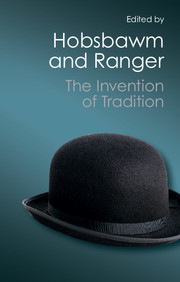Book contents
- Frontmatter
- Contents
- Contributors
- 1 Introduction: Inventing Traditions
- 2 The Invention of Tradition: The Highland Tradition of Scotland
- 3 From a Death to a View: The Hunt for the Welsh Past in the Romantic Period
- 4 The Context, Performance and Meaning of Ritual: The British Monarchy and the ‘Invention of Tradition’, c. 1820–1977
- 5 Representing Authority in Victorian India
- 6 The Invention of Tradition in Colonial Africa
- 7 Mass-Producing Traditions: Europe, 1870–1914
- Index
1 - Introduction: Inventing Traditions
Published online by Cambridge University Press: 05 July 2014
- Frontmatter
- Contents
- Contributors
- 1 Introduction: Inventing Traditions
- 2 The Invention of Tradition: The Highland Tradition of Scotland
- 3 From a Death to a View: The Hunt for the Welsh Past in the Romantic Period
- 4 The Context, Performance and Meaning of Ritual: The British Monarchy and the ‘Invention of Tradition’, c. 1820–1977
- 5 Representing Authority in Victorian India
- 6 The Invention of Tradition in Colonial Africa
- 7 Mass-Producing Traditions: Europe, 1870–1914
- Index
Summary
Nothing appears more ancient, and linked to an immemorial past, than the pageantry which surrounds British monarchy in its public ceremonial manifestations. Yet, as a chapter in this book establishes, in its modern form it is the product of the late nineteenth and twentieth centuries. ‘Traditions’ which appear or claim to be old are often quite recent in origin and sometimes invented. Anyone familiar with the colleges of ancient British universities will be able to think of the institution of such ‘traditions’ on a local scale, though some – like the annual Festival of Nine Lessons and Carols in the chapel of King's College, Cambridge on Christmas Eve – may become generalized through the modern mass medium of radio. This observation formed the starting-point of a conference organized by the historical journal Past & Present, which in turn forms the basis of the present book.
The term ‘invented tradition’ is used in a broad, but not imprecise sense. It includes both ‘ traditions’ actually invented, constructed and formally instituted and those emerging in a less easily traceable manner within a brief and dateable period – a matter of a few years perhaps – and establishing themselves with great rapidity. The royal Christmas broadcast in Britain (instituted in 1932) is an example of the first; the appearance and development of the practices associated with the Cup Final in British Association Football, of the second. It is evident that not all of them are equally permanent, but it is their appearance and establishment rather than their chances of survival which are our primary concern.
- Type
- Chapter
- Information
- The Invention of Tradition , pp. 1 - 14Publisher: Cambridge University PressPrint publication year: 2012
- 340
- Cited by

